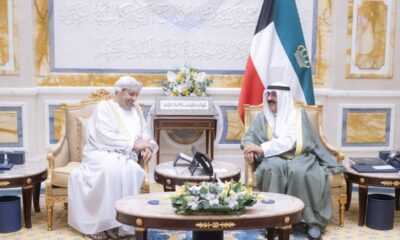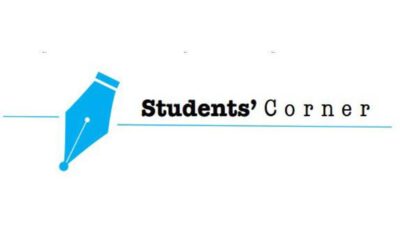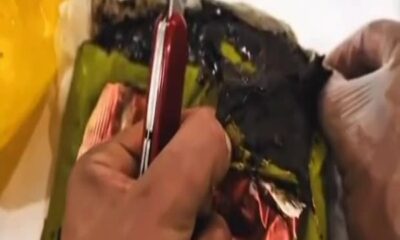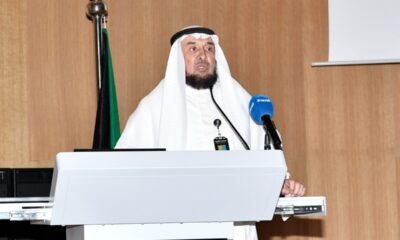KUWAIT: As Eid approaches, it’s easy to notice how different gold markets draw in people with different nationalities. According to local jewelers, one key factor drives these preferences: karat – the measure of gold’s purity mixed with other metals. The availability of certain karats across shops not only impacts price, but also influences the jewelry’s color, strength and the styles favored by each community.
“Each country tends to have its own distinct preference for gold karat,” said Ahmad Gad, a jeweler at Al-Mubarakiya Gold Souq, one of the most popular markets among diverse nationalities in Kuwait.
He broke down the three most common karats in Kuwait and who typically prefers each: “Indians usually go for the rich yellow of 22K gold. Arabs lean toward 21K for its shine. As for 18K, which has a softer glow, it’s often chosen by people who like European styles — Filipinos, for example.”
Ahmad Gad, a jeweler in Kuwait.
A vendor shows a gold necklace to a customer at the gold exhibition.
The Indian favorite
Indian buyers are especially drawn to 22K gold, valuing both its high purity and cultural significance. “For Indians, what matters most is purity. If it were practical, they’d choose 24K – but it’s too soft for jewelry,” said Ayoub, an Indian gold salesman who has worked in Kuwait for seven years.
Pure 24-karat gold, considered 100 percent gold, is typically reserved for bars and coins, as its softness makes it unsuitable for wearable, intricately designed jewelry. To increase durability, gold is alloyed with other metals, resulting in lower karats: 22K gold contains 91.7 percent pure gold, and is ideal for the ornate, heavily detailed pieces typical in Indian culture.
“Our classic Indian pieces can only be made with 22K,” said Naresh Kumar, a jeweler at Souq Al Wataniya in Kuwait City, which mainly serves Indian and Bengali customers. “It’s also the standard karat in India, so it’s easier to resell there.” Gad added, “Every community prefers gold that can be resold easily in their home country.”
Smart investment
Despite its cultural significance, 22K gold is less commonly stocked in Kuwait compared to 21K. You’ll find 21K gold widely available in popular markets like Al-Mubarakiya, Hawally, Salmiya and Farwaniya. According to jewelers, 21K is the most sought-after karat among Arabs. With 87.5% purity, it offers a sweet spot between visual beauty and long-term value. “21K is ideal for those who want a beautiful ornament that also holds its value,” said Gad. “It has a higher resale price compared to lower karats, especially if it’s locally made Kuwaiti gold, free of decorative cloves.”
Kuwait is known for its high-quality 21K gold, thanks in part to strong trade ties with the UAE, home to some of the Gulf’s most skilled goldsmiths. This partnership enables Kuwait to import a wide variety of 21K designs in large quantities.
Elegant, but less valuable
By contrast, 18K gold is found in smaller quantities across Kuwait, mostly in the Salmiya Gold Souq, which caters largely to Filipino buyers. While 18K contains 75 percent pure gold and is often used for dainty, European-style pieces, jewelers say it carries the highest making charges and offers weaker resale value, making it less appealing to investment-focused shoppers.
“The lower the gold’s karat, the harder it is to mold,” explained Kumar. “Working with low karats like 18K takes more time and precision, which increases labor costs.” That added labor is reflected in the making charge — a markup applied to the price of gold per gram for craftsmanship, which doesn’t contribute to the resale value.
Still, 18K remains the go-to for many Filipino shoppers and others who prioritize aesthetics over return value. “I prefer 18K because it’s simpler and more elegant,” said Rachel, a Filipino customer. “The higher-karat designs are too loud – too madame. Unlike 18K pieces which I can easily stack and wear daily without feeling it’s too much.
For many, gold is more than a fashion statement – it’s financial security. “Gold is the most affordable investment for me right now. Instead of wasting money, I buy gold. It’s like my money is still there, just preserved in a different form,” said Nada Dawod, an Egyptian gold enthusiast.
“When I was younger, I loved 18K gold,” she said. “But once I started buying gold with my own money, I switched to 21K. It has better resale value and comes with a lower making charge. Even if I like a design in 18K, I try to find a similar one in 21K.”


















